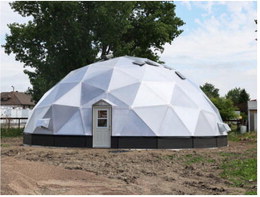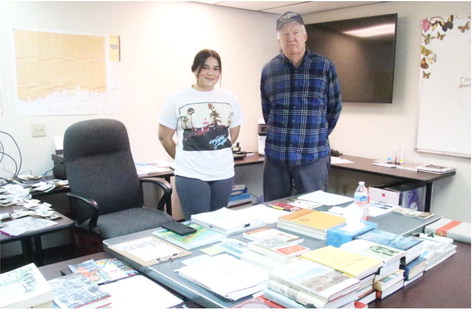Fort Peck Community College Adds Grow Dome To Community Garden


Fort Peck Community College officials are excited about the addition of a geodesic greenhouse or “the grow dome” in the school’s community garden in Poplar. Elijah Hopkins, Knowledge Project leader, and Samantha Azure, traditional practices for wellness director, will serve as managers.
Hopkins noted the 42-foot diameter facility will help grow medicinal plants, fruits and vegetables year round with little to no fossil fuel. He added the Grow Dome demonstrates the college’s commitment to promote best practices for medicinal and food sovereignty with STEM technologies.
The estimated $80,000 facility was funded through a Sovereign Equity Fund’s Cultural Foodways award that FPCC received starting in 2023.
The mission of the Cultural Foodways Fund is to promote the study, practice and recognition of indigenous food and agriculture knowledge at tribal schools and create platforms that celebrate community led and culturally appropriate ways of sharing that knowledge.
The two-year grant was for a total of $200,000. The project incorporates cultural literacy by integrating cultural values of prayer, health, relationships and cleansing in each event and activity.
Hopkins said the structure was originally purchased a year and a half ago. The greenhouse is located just north of FPCC’s tribal library. The greenhouse will be open often, but not for 24 hours a day. There will be an eightfoot fence around the facility for security reasons.
He explained the inside of the greenhouse includes a huge water tank to regulate temperature and provide moisture for plants. The plan is to stock the water tank with fish.
Hopkins feels that FPCC as a tribal college should be leading the way regarding food sustainability and food sovereignty.
Hopkins see the greenhouse as a place for students and community members to plant crops and participate in harvesting. He wants students to examine plants for educational purposes and discover the indigenous name of plants.
Plants are anticipated to include sweet grass, corn and beans. He also mentioned “start” plants, which are planted earlier in the year.
“We’re excited to get it going and share it with the community,” Hopkins said.
He is hopeful to have a community open house sometime in the future.


